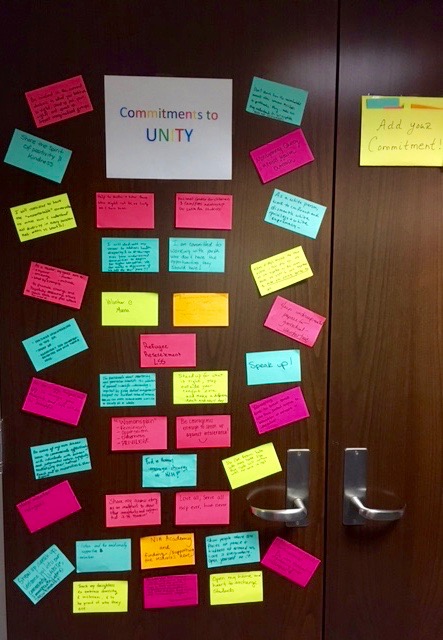As you prepare for graduate, professional school or job interviews, you may be asked a question related to diversity. Interviewers are very interested in selecting candidates who are aware of and who will contribute to the diversity mission of their organization. Have you practiced how you will answer diversity-related questions? In Career Services, we have seen trainees range in their comfort level about addressing diversity topics. Some trainees have several experiences to answer these questions, that said—many others are unsure how to approach answering the question. Perhaps they do not feel well-versed in diversity-topics, may be from a majority or underrepresented group and wonder how to respond, feel that are being asked to disclose personal information, are unclear about why they are being asked the question, or how to structure their answer. Here are some possible questions that you may be asked:
- How do you define diversity?
- Do you have experience with diversity in this field?
- How will you contribute to the mission of diversity and inclusion in our company?
- How will you enhance the inclusion and diversity of your colleagues/peers?
- Have you had to address a diversity issue while at work?
- How will you bring diversity to the classroom at our university?
Prepare Early. Research and build your vocabulary related to diversity and inclusion. Explore scientific organizations, newsletters, professional journals or Google related to diversity and inclusion issues. In general, diversity relates to the range of human uniqueness, including race, ethnicity, gender, gender identity, sexual orientation, age, social class, physical ability or attributes, religious or ethical values system, national origin, and political beliefs. Inclusion is the behavior of increasing the involvement and empowerment of individuals in a group to create a culture of belonging. Ask yourself, what are the issues in your current and/or future profession? What is your knowledge of disparities, diversity issues in research or treatment, the recruitment of a diverse workforce, serving a broader public. See the OITE blog post about how those on the academic job market can respond to diversity statements that are requested by many teaching positions. Are diversity questions illegal to ask? Good question! In general, diversity questions are asked to all applications equally by interviewers who have had training because there is an explicit mission to enhance the diversity and inclusion mission of their organization. You do not have to disclose personal information to answer a diversity question (i.e.: your age, ethnicity, etc.). However, with illegal questions you are being asked to disclose personal information about your race, gender, sexuality, age, disability status in such a way that it does not speak to your strengths for the position. What perspectives can I take to answer the question? Once you are familiar with the issues above, re-read the wording of the question to determine what is being asked of you. If you do not have experience, then be honest and say so. Go on to describe your awareness of diversity issues and specifics of how you plan to address them in the future. Answering this way will put you in in a positive light to share additional skills and experiences or connections to the position that will enhance your application. For example, you could communicate leadership skills, teamwork, community service, other experience that you have or a program that you would like to start. Here are some perspectives to consider taking:
- Connect your experience and goals to their mission statement or programs they are already involved in? Give an example.
- Discuss skills or abilities that you bring and how they will be useful to encourage a culture of inclusion.
- Discuss an ethical in your profession that affects people differently.
- Explain something from your personal life and describe specific ways that this it will help you in that organization
- Think of diversity more broadly because diversity can include international experiences, experience with various age groups, and/or rural, urban, mountain communities that may have unique needs and resources.
Try using the SAR technique Use the behavioral interviewing technique called SAR (Situation, Actions, Result) as a strategy. This technique is based on the philosophy that if you have done it in the past, then you will repeat it in the future. It helps the interviewer envision the behaviors they are likely to see you doing to support the mission of diversity and inclusion while there. Get Involved Now One of OITE’s goals is to create a culture of inclusion among our diverse scientist trainees. The OITE leadership group creates quarterly get-togethers for all trainees. Please join us for the upcoming OITE Trainee Unity Day, August 23, 2017 from Noon -1:00pm in building 50, Ground Floor Conference Room. The NIH Academy programs are designed for participants to explore and address health disparities. The Workplace Dynamics series prepares NIH trainees for leadership roles through a series of 5 workshops including the Workplace Dynamics V: Diversity in a Multicultural Society.. The OITE affinity groups are available to NIH trainees and their allies related to such affinity groups as international and visiting scholars, LGBTQ, trainees of color, and those who have families. The NIH also creates community through SIGS (Scientific Interest Groups) where participants join from across the NIH Institutes on topics of interest to scientists. Please feel free to visit the OITE Career Services website and take part in career counseling, pre-professional advising and schedule a mock interview to get prepared for graduate school, post doc, and job interviews. If you are beyond NIH, we recommend looking in your respective colleges, universities, workplaces, or larger communities to connect and find services.


